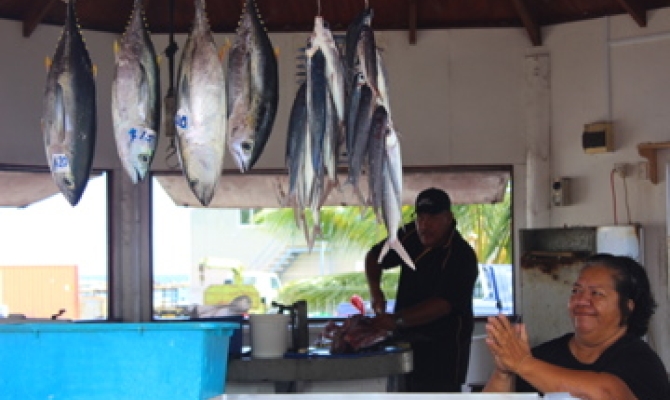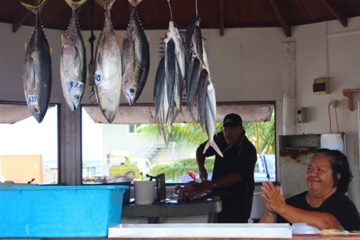
Climate Change Resilience
7 October 2015, Auckland, New Zealand - Strengthening Pacific island resilience to Ocean Acidification is at the core of an action based partnership coordinated by the Secretariat of the Pacific Regional Environment Programme (SPREP) and supported by the Government of New Zealand.
This week a regional workshop is bringing together Pacific island countries, stakeholders and experts on the threats posed by ocean acidification to the region, an activity under the very first Pacific island regional initiative to address ocean acidification. Outcomes from the three day consultation workshop will include key adaptation and resilience building activities; a plan of action for the way forward, and the identification of initial ocean acidification pilot project sites across the region.
"We have embarked on a new Pacific Islands Partnership on Ocean Acidification which will ensure that the actions are driven by Pacific Small Island Developing States, connected by SIDS and focused on SIDS – this initial three day planning workshop is making sure of this," said Mr. Kosi Latu, Deputy Director General of SPREP.
 Fish for sale at the Punanga Nui Market in the Cook Islands
Fish for sale at the Punanga Nui Market in the Cook Islands
Ocean acidification poses a direct threat to the marine resources such as coral reefs and sea shells. It will also have direct and indirect impacts on Pacific island coastal and pelagic ecosystems. In the Pacific islands, coastal fisheries accounts for USD 200 million in subsistence value and another USD 165 million in commercial value with the Pacific island region industrial tuna fisheries estimated at USD 6 billion.
"Coral reefs are key attractions for our tourism sector, and provide important ecosystem services in protecting our coastal communities and providing key fisheries habitats. Thus, it is imperative that we take action now to protect these important resources and through this Partnership, we are doing so," said Mr. Latu.
The Pacific Islands Partnership on Ocean Acidification stems from an official two day side event at the Third United Nations Small Islands Developing States Conference in Apia, Samoa in 2014, co-hosted by the United States and New Zealand, in partnership with SPREP.
It identified the need for more local research and monitoring as well as capacity building and coordination at national and regional level as well as the need for an integrated approach to monitoring, resilience building strategies, and practical adaptation strategies. These findings were subsequently recorded in the "Samoa Pathway" SIDS Conference outcome document and have now led to this action based partnership.
"We need to better understand ocean acidification issues and the inter-linkages to other systems so we could have a robust and integrated approach to reducing ocean acidification and identifying appropriate adaptation," said Mr. Latu.
 Participants at the three day regional planning workshop
Participants at the three day regional planning workshop
The three day regional planning workshop is held in Auckland, New Zealand from 7 – 9 October, 2015.
Representatives from the countries of Commonwealth of the Northern Marianas, Fiji, Kiribati, Marshall Islands, Palau, Papua New Guinea, Samoa, Solomon Islands, Tokelau, Tonga, Tuvalu and Vanuatu are participating.
Partners from Greenpeace, James Cook University, L'Institut de recherche pour le développement (IRD), NZ Ministry of Foreign Affairs and Trade, NZ National Institute of Water and Atmospheric Research, Secretariat of the Pacific Community, The Nature Conservancy, University of the South Pacific, University of Otago, US National Oceanographic and Atmospheric Administration (NOAA), and the University of Auckland are also participating in the workshop.
For more information please contact: Dr. Thomas Moore, PI-GOOS Officer of SPREP at [email protected]
This week a regional workshop is bringing together Pacific island countries, stakeholders and experts on the threats posed by ocean acidification to the region, an activity under the very first Pacific island regional initiative to address ocean acidification. Outcomes from the three day consultation workshop will include key adaptation and resilience building activities; a plan of action for the way forward, and the identification of initial ocean acidification pilot project sites across the region.
"We have embarked on a new Pacific Islands Partnership on Ocean Acidification which will ensure that the actions are driven by Pacific Small Island Developing States, connected by SIDS and focused on SIDS – this initial three day planning workshop is making sure of this," said Mr. Kosi Latu, Deputy Director General of SPREP.
 Fish for sale at the Punanga Nui Market in the Cook Islands
Fish for sale at the Punanga Nui Market in the Cook IslandsOcean acidification poses a direct threat to the marine resources such as coral reefs and sea shells. It will also have direct and indirect impacts on Pacific island coastal and pelagic ecosystems. In the Pacific islands, coastal fisheries accounts for USD 200 million in subsistence value and another USD 165 million in commercial value with the Pacific island region industrial tuna fisheries estimated at USD 6 billion.
"Coral reefs are key attractions for our tourism sector, and provide important ecosystem services in protecting our coastal communities and providing key fisheries habitats. Thus, it is imperative that we take action now to protect these important resources and through this Partnership, we are doing so," said Mr. Latu.
The Pacific Islands Partnership on Ocean Acidification stems from an official two day side event at the Third United Nations Small Islands Developing States Conference in Apia, Samoa in 2014, co-hosted by the United States and New Zealand, in partnership with SPREP.
It identified the need for more local research and monitoring as well as capacity building and coordination at national and regional level as well as the need for an integrated approach to monitoring, resilience building strategies, and practical adaptation strategies. These findings were subsequently recorded in the "Samoa Pathway" SIDS Conference outcome document and have now led to this action based partnership.
"We need to better understand ocean acidification issues and the inter-linkages to other systems so we could have a robust and integrated approach to reducing ocean acidification and identifying appropriate adaptation," said Mr. Latu.
 Participants at the three day regional planning workshop
Participants at the three day regional planning workshopThe three day regional planning workshop is held in Auckland, New Zealand from 7 – 9 October, 2015.
Representatives from the countries of Commonwealth of the Northern Marianas, Fiji, Kiribati, Marshall Islands, Palau, Papua New Guinea, Samoa, Solomon Islands, Tokelau, Tonga, Tuvalu and Vanuatu are participating.
Partners from Greenpeace, James Cook University, L'Institut de recherche pour le développement (IRD), NZ Ministry of Foreign Affairs and Trade, NZ National Institute of Water and Atmospheric Research, Secretariat of the Pacific Community, The Nature Conservancy, University of the South Pacific, University of Otago, US National Oceanographic and Atmospheric Administration (NOAA), and the University of Auckland are also participating in the workshop.
For more information please contact: Dr. Thomas Moore, PI-GOOS Officer of SPREP at [email protected]